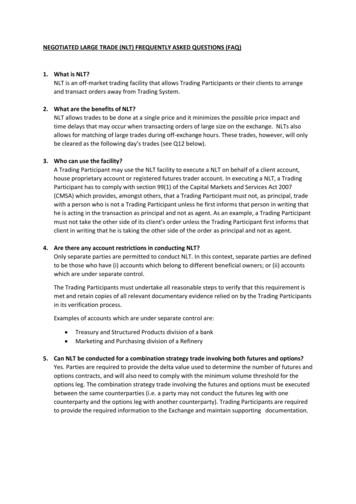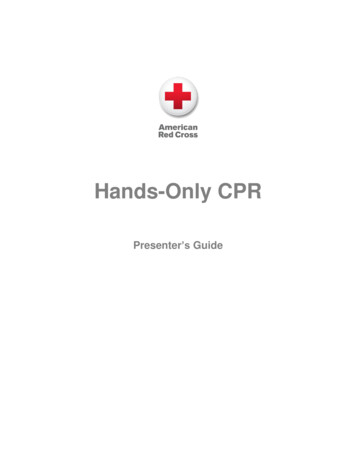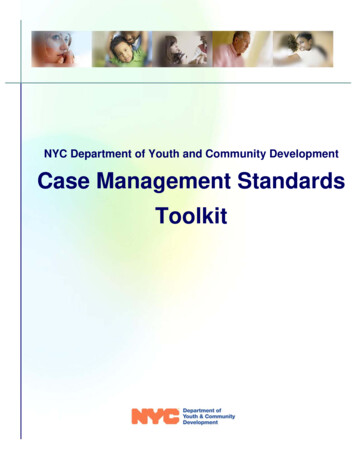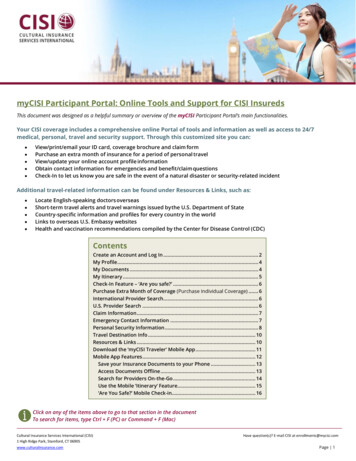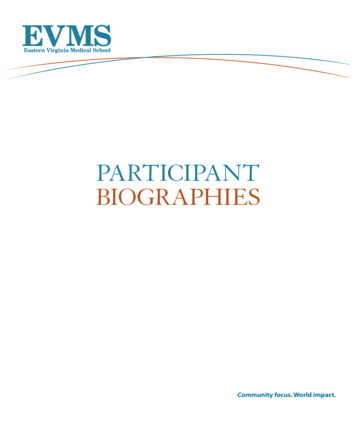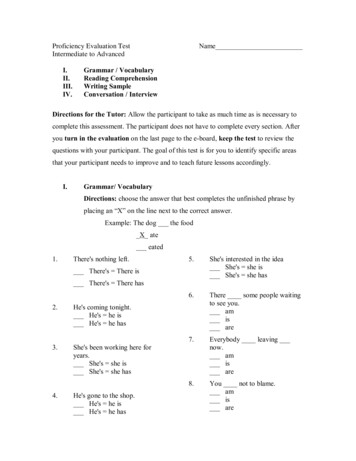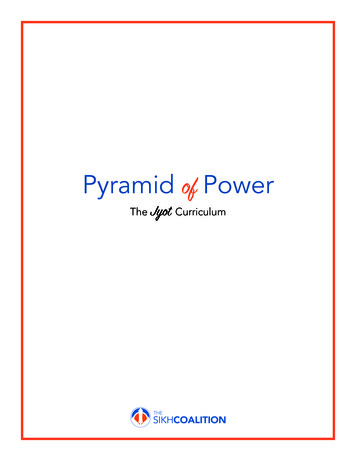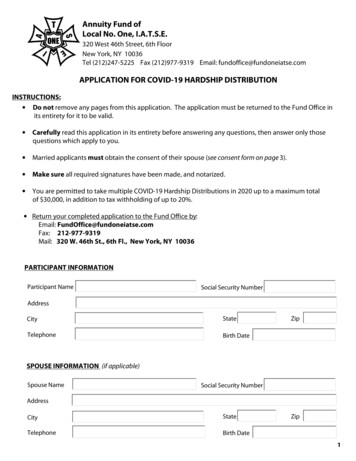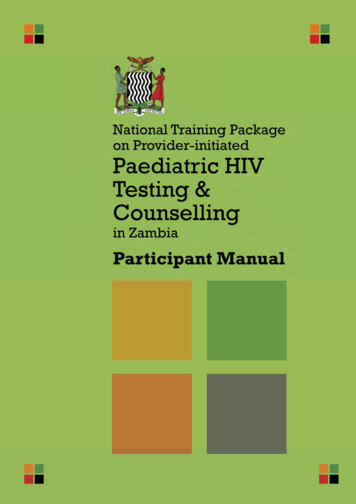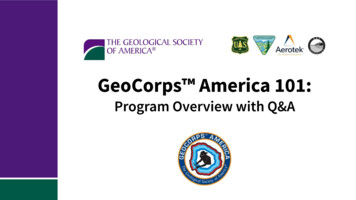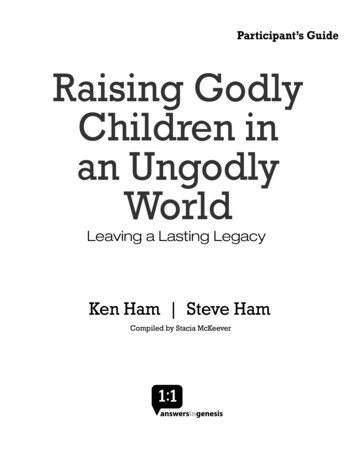
Transcription
Participant’s GuideRaising GodlyChildren inan UngodlyWorldLeaving a Lasting LegacyKen Ham Steve HamCompiled by Stacia McKeever
Copyright 2010 Answers in Genesis. All rights reserved.Originally printed as Genesis of a Legacy. Copyright 2006 Answers in Genesis. All rightsreserved.Cover design: Brandie LucasInterior layout: Diane KingProject coordinator: Stacia McKeeverEditors: Melinda Christian, Irene Lewis, Gary VaterlausScripture quotations marked “NKJV” are taken from the New King James Version . Copyright 1982 by Tomas Nelson, Inc. Used by permission. All rights reserved.Scripture quotations marked “NASB” are taken from the NEW AMERICAN STANDARDBIBLE . Copyright 1960,1962,1963,1968,1971,1972,1973,1975,1977,1995 by TheLockman Foundation. Used by permission.Scripture quotations marked “NIV” are taken from the HOLY BIBLE, NEW INTERNATIONAL VERSION . Copyright 1973, 1978, 1984 International Bible Society. Used bypermission of Zondervan. All rights reserved. The “NIV” and “New International Version”trademarks are registered in the United States Patent and Trademark Office by International Bible Society. Use of either trademark requires the permission of International BibleSociety.
TABLE OF CONTENTSIntroduction Raising Godly Children7Class Requirements. . . . . . . . . . . . . . . . . . . . . . . . . . . . . . . . . . . . . . . . . . . . . . . . . . . . . . . . . 8About the Raising Godly Children Curriculum and Book. . . . . . . . . . . . . . . . . . . . . . . . . . . . . . . 8Session 1 The Genesis Family9Overview. . . . . . . . . . . . . . . . . . . . . . . . . . . . . . . . . . . . . . . . . . . . . . . . . . . . . . . . . . . . . . . . . 9Getting Started . . . . . . . . . . . . . . . . . . . . . . . . . . . . . . . . . . . . . . . . . . . . . . . . . . . . . . . . . . . . 9The Genesis Family video outline . . . . . . . . . . . . . . . . . . . . . . . . . . . . . . . . . . . . . . . . . . . . . . . 10Bringing It Home. . . . . . . . . . . . . . . . . . . . . . . . . . . . . . . . . . . . . . . . . . . . . . . . . . . . . . . . . . 12Homework . . . . . . . . . . . . . . . . . . . . . . . . . . . . . . . . . . . . . . . . . . . . . . . . . . . . . . . . . . . . . . 14For More Information . . . . . . . . . . . . . . . . . . . . . . . . . . . . . . . . . . . . . . . . . . . . . . . . . . . . . . 15Session 217Overview. . . . . . . . . . . . . . . . . . . . . . . . . . . . . . . . . . . . . . . . . . . . . . . . . . . . . . . . . . . . . . . . 17Getting Started . . . . . . . . . . . . . . . . . . . . . . . . . . . . . . . . . . . . . . . . . . . . . . . . . . . . . . . . . . . 18The Genesis of a Worldview video outline. . . . . . . . . . . . . . . . . . . . . . . . . . . . . . . . . . . . . . . . . . 18Bringing It Home. . . . . . . . . . . . . . . . . . . . . . . . . . . . . . . . . . . . . . . . . . . . . . . . . . . . . . . . . . 21Homework. . . . . . . . . . . . . . . . . . . . . . . . . . . . . . . . . . . . . . . . . . . . . . . . . . . . . . . . . . . . . . . 23For More Information. . . . . . . . . . . . . . . . . . . . . . . . . . . . . . . . . . . . . . . . . . . . . . . . . . . . . . 24Session 3 Vegemite Kids25Overview. . . . . . . . . . . . . . . . . . . . . . . . . . . . . . . . . . . . . . . . . . . . . . . . . . . . . . . . . . . . . . . . 25Getting Started . . . . . . . . . . . . . . . . . . . . . . . . . . . . . . . . . . . . . . . . . . . . . . . . . . . . . . . . . . . 25Vegemite Kids video outline. . . . . . . . . . . . . . . . . . . . . . . . . . . . . . . . . . . . . . . . . . . . . . . . . . . 26Bringing It Home. . . . . . . . . . . . . . . . . . . . . . . . . . . . . . . . . . . . . . . . . . . . . . . . . . . . . . . . . . 29Frequently Asked Question . . . . . . . . . . . . . . . . . . . . . . . . . . . . . . . . . . . . . . . . . . . . . . . . . . 31Homework. . . . . . . . . . . . . . . . . . . . . . . . . . . . . . . . . . . . . . . . . . . . . . . . . . . . . . . . . . . . . . . 31For More Information. . . . . . . . . . . . . . . . . . . . . . . . . . . . . . . . . . . . . . . . . . . . . . . . . . . . . . 32
Raising Godly Children Session 4 God-Given Roles in Marriage33Overview. . . . . . . . . . . . . . . . . . . . . . . . . . . . . . . . . . . . . . . . . . . . . . . . . . . . . . . . . . . . . . . . 33Getting Started . . . . . . . . . . . . . . . . . . . . . . . . . . . . . . . . . . . . . . . . . . . . . . . . . . . . . . . . . . . 33Lesson. . . . . . . . . . . . . . . . . . . . . . . . . . . . . . . . . . . . . . . . . . . . . . . . . . . . . . . . . . . . . . . . . . 34Bringing It Home. . . . . . . . . . . . . . . . . . . . . . . . . . . . . . . . . . . . . . . . . . . . . . . . . . . . . . . . . . 36Frequently Asked Questions. . . . . . . . . . . . . . . . . . . . . . . . . . . . . . . . . . . . . . . . . . . . . . . . . . 36Homework. . . . . . . . . . . . . . . . . . . . . . . . . . . . . . . . . . . . . . . . . . . . . . . . . . . . . . . . . . . . . . . 37For More Information. . . . . . . . . . . . . . . . . . . . . . . . . . . . . . . . . . . . . . . . . . . . . . . . . . . . . . 39Session 5 God-Given Roles in the Family41Overview. . . . . . . . . . . . . . . . . . . . . . . . . . . . . . . . . . . . . . . . . . . . . . . . . . . . . . . . . . . . . . . . 41Getting Started . . . . . . . . . . . . . . . . . . . . . . . . . . . . . . . . . . . . . . . . . . . . . . . . . . . . . . . . . . . 41Lesson. . . . . . . . . . . . . . . . . . . . . . . . . . . . . . . . . . . . . . . . . . . . . . . . . . . . . . . . . . . . . . . . . . 41Bringing It Home. . . . . . . . . . . . . . . . . . . . . . . . . . . . . . . . . . . . . . . . . . . . . . . . . . . . . . . . . . 43Frequently Asked Question . . . . . . . . . . . . . . . . . . . . . . . . . . . . . . . . . . . . . . . . . . . . . . . . . . 43Homework. . . . . . . . . . . . . . . . . . . . . . . . . . . . . . . . . . . . . . . . . . . . . . . . . . . . . . . . . . . . . . . 44For More Information. . . . . . . . . . . . . . . . . . . . . . . . . . . . . . . . . . . . . . . . . . . . . . . . . . . . . . 44Session 6 Discipline: Producing a Harvest ofPeace and Righteousness47Overview. . . . . . . . . . . . . . . . . . . . . . . . . . . . . . . . . . . . . . . . . . . . . . . . . . . . . . . . . . . . . . . . 47Getting Started . . . . . . . . . . . . . . . . . . . . . . . . . . . . . . . . . . . . . . . . . . . . . . . . . . . . . . . . . . . 47Lesson. . . . . . . . . . . . . . . . . . . . . . . . . . . . . . . . . . . . . . . . . . . . . . . . . . . . . . . . . . . . . . . . . . 48Bringing It Home. . . . . . . . . . . . . . . . . . . . . . . . . . . . . . . . . . . . . . . . . . . . . . . . . . . . . . . . . . 52Frequently Asked Questions. . . . . . . . . . . . . . . . . . . . . . . . . . . . . . . . . . . . . . . . . . . . . . . . . . 53Homework. . . . . . . . . . . . . . . . . . . . . . . . . . . . . . . . . . . . . . . . . . . . . . . . . . . . . . . . . . . . . . . 54For More Information. . . . . . . . . . . . . . . . . . . . . . . . . . . . . . . . . . . . . . . . . . . . . . . . . . . . . . 55Session 7 Communicating Biblically with Your Children57Overview. . . . . . . . . . . . . . . . . . . . . . . . . . . . . . . . . . . . . . . . . . . . . . . . . . . . . . . . . . . . . . . . 57Getting Started . . . . . . . . . . . . . . . . . . . . . . . . . . . . . . . . . . . . . . . . . . . . . . . . . . . . . . . . . . . 57Lesson. . . . . . . . . . . . . . . . . . . . . . . . . . . . . . . . . . . . . . . . . . . . . . . . . . . . . . . . . . . . . . . . . . 58Bringing It Home. . . . . . . . . . . . . . . . . . . . . . . . . . . . . . . . . . . . . . . . . . . . . . . . . . . . . . . . . . 60Homework. . . . . . . . . . . . . . . . . . . . . . . . . . . . . . . . . . . . . . . . . . . . . . . . . . . . . . . . . . . . . . . 61For More Information. . . . . . . . . . . . . . . . . . . . . . . . . . . . . . . . . . . . . . . . . . . . . . . . . . . . . . 62Session 8 Growing a Godly Heritage65Overview. . . . . . . . . . . . . . . . . . . . . . . . . . . . . . . . . . . . . . . . . . . . . . . . . . . . . . . . . . . . . . . . 65Getting Started . . . . . . . . . . . . . . . . . . . . . . . . . . . . . . . . . . . . . . . . . . . . . . . . . . . . . . . . . . . 65Growing a Godly Heritage video outline. . . . . . . . . . . . . . . . . . . . . . . . . . . . . . . . . . . . . . . . . . . 66Bringing It Home. . . . . . . . . . . . . . . . . . . . . . . . . . . . . . . . . . . . . . . . . . . . . . . . . . . . . . . . . . 674
Raising Godly Children Homework. . . . . . . . . . . . . . . . . . . . . . . . . . . . . . . . . . . . . . . . . . . . . . . . . . . . . . . . . . . . . . . 69For More Information. . . . . . . . . . . . . . . . . . . . . . . . . . . . . . . . . . . . . . . . . . . . . . . . . . . . . . 70Session 9 The Family Fortress71Overview. . . . . . . . . . . . . . . . . . . . . . . . . . . . . . . . . . . . . . . . . . . . . . . . . . . . . . . . . . . . . . . . 71Getting Started . . . . . . . . . . . . . . . . . . . . . . . . . . . . . . . . . . . . . . . . . . . . . . . . . . . . . . . . . . . 71The Family Fortress video outline . . . . . . . . . . . . . . . . . . . . . . . . . . . . . . . . . . . . . . . . . . . . . . . 72Bringing It Home. . . . . . . . . . . . . . . . . . . . . . . . . . . . . . . . . . . . . . . . . . . . . . . . . . . . . . . . . . 73Homework. . . . . . . . . . . . . . . . . . . . . . . . . . . . . . . . . . . . . . . . . . . . . . . . . . . . . . . . . . . . . . . 76For More Information. . . . . . . . . . . . . . . . . . . . . . . . . . . . . . . . . . . . . . . . . . . . . . . . . . . . . . 79Session 10 Developing a Biblical Mindset About Moneyand Possessions81Overview. . . . . . . . . . . . . . . . . . . . . . . . . . . . . . . . . . . . . . . . . . . . . . . . . . . . . . . . . . . . . . . . 81Getting Started . . . . . . . . . . . . . . . . . . . . . . . . . . . . . . . . . . . . . . . . . . . . . . . . . . . . . . . . . . . 81Lesson. . . . . . . . . . . . . . . . . . . . . . . . . . . . . . . . . . . . . . . . . . . . . . . . . . . . . . . . . . . . . . . . . . 82Bringing It Home. . . . . . . . . . . . . . . . . . . . . . . . . . . . . . . . . . . . . . . . . . . . . . . . . . . . . . . . . . 86Homework. . . . . . . . . . . . . . . . . . . . . . . . . . . . . . . . . . . . . . . . . . . . . . . . . . . . . . . . . . . . . . . 93For More Information. . . . . . . . . . . . . . . . . . . . . . . . . . . . . . . . . . . . . . . . . . . . . . . . . . . . . . 95Session 11 Parenting Practices97Overview. . . . . . . . . . . . . . . . . . . . . . . . . . . . . . . . . . . . . . . . . . . . . . . . . . . . . . . . . . . . . . . . 97Getting Started . . . . . . . . . . . . . . . . . . . . . . . . . . . . . . . . . . . . . . . . . . . . . . . . . . . . . . . . . . . 97Parenting Practices video outline. . . . . . . . . . . . . . . . . . . . . . . . . . . . . . . . . . . . . . . . . . . . . . . . 97Bringing It Home. . . . . . . . . . . . . . . . . . . . . . . . . . . . . . . . . . . . . . . . . . . . . . . . . . . . . . . . . . 99Homework. . . . . . . . . . . . . . . . . . . . . . . . . . . . . . . . . . . . . . . . . . . . . . . . . . . . . . . . . . . . . . 101For More Information. . . . . . . . . . . . . . . . . . . . . . . . . . . . . . . . . . . . . . . . . . . . . . . . . . . . . 1015
Raising Godly Children 6
INTRODUCTIONRaising Godly ChildrenThe Psalmist, guided by the Holy Spirit, wrote in Psalm 127:3–5 (NASB):Behold, children are a gift of the Lord,The fruit of the womb is a reward.Like arrows in the hand of a warrior,So are the children of one’s youth.How blessed is the man whose quiver is full of them;They will not be ashamedWhen they speak with their enemies in the gate.Truly, children are a blessing and gift from the Lord and a source of great joy toparents. Yet children can also be the cause of great heartache to many parents. Wesee disobedient children throwing temper tantrums in the supermarket. Schools arefilled with wild and unruly students. Increasingly, even children of Christian parentsare “leaving the fold” once they graduate and head off on their own.While each individual child is responsible for his decisions and behavior before the Lord, the Bible is full of commands to parents regarding how theyshould train up their children and warnings of what will happen if they donot fulfill the instructions of the Creator. With this curriculum, our desire is notto merely provide “how-to” instructions on child-rearing, but rather to exhort parents to understand that raising their children is their ministry, not merely another jobon their list of things to do. Parents who instill in their families a love for the Lordare, in effect, carrying out the Great Commission given to us by our Lord and Savior(Matthew 28:19–20). Truly, raising godly children is one of the means by which ourCreator enables us to fulfill this command.The Lord has promised to give us everything we need for life and godlinessthrough our knowledge of Him who called us to eternal life (2 Peter 1:3).Although each child is unique and individual circumstances vary greatly, Godhas promised that His Word is profitable for teaching, reproof, correction
Raising Godly ChildrenRaising Godly Childrenand training in righteousness so that the man of God may be thoroughlyequipped for every good work (2 Timothy 3:16–17).Throughout this course we’ll be discussing what the Bible—the Word of theOne who created us and called us to eternal life—teaches about raising children to be godly. We’ll be addressing questions such as the following: What is my goal in raising my children? How can I make the Bible “real” to my children? What does the Bible say about my role in my family? What does the Bible say about discipline? How do I know God’s Word is an all-sufficient parenting guide? How can I effectively communicate the truths of Scripture to my children? What are my educational choices? What should I teach my children about being wise stewards of theirpossessions?Over the next 11 weeks, Ken Ham (president and CEO of Answers in Genesis) andhis younger brother Stephen Ham will be our guides as we discover that the legacy weleave for our children begins as we love the Lord and accept His Word as our authority, committing to use it to guide us in all areas of our lives.Class RequirementsFor each lesson, you will need: Participant worksheets (which feature the lesson outline, discussionquestions, homework and list of suggested resources) Bible Writing toolAbout the Raising Godly Children Curriculum and BookThe Raising Godly Children in an Ungodly World curriculum is based on the DVDs featuring Ken Ham and Steve Ham. Their same-titled book (not included with the curriculum, but available at AnswersBookstore.com) adds an historical perspective to thistopic as they address in more detail the legacy their father left them and their siblings.8
SESSION 1The Genesis FamilyOverviewMoney, property, an original Van Gogh, a set of old baseball cards, an antique chinacabinet. These are the types of items usually mentioned when parents discuss thelegacy they will leave for their children. Yet all of these are only temporal. In this lesson, Ken Ham challenges parents (and parents-to-be) to consider the legacy they willleave for their children—is it an inheritance of things temporal or of things eternal?With a brief tour of history, Ken discusses the legacy left by three men—John Bunyan,Martin Luther and Charles Darwin—and the lasting impact their legacies have had,not just on their children, but on the world. On a more personal note, Ken explainsthe inheritance he gained from his father: a heart for reaching people with the gospeland a love for the Word of God.He ends with the challenging question: What inheritance are you leaving for yourchildren, friends and neighbors?Getting StartedThe Creator has promised to give us everything we need for life and godliness throughour knowledge of Him who called us to eternal life (2 Peter 1:3). Although eachchild is unique, and individual circumstances vary greatly, God has promised that HisWord is profitable for teaching, reproof, correction and training in righteousness sothat the man of God may be thoroughly equipped for every good work (2 Timothy3:16–17). Throughout this course we’ll be discussing what the Bible—the Word ofthe One who created us and called us to eternal life—teaches about how to leave agodly legacy for our children.Before we watch the video, let’s talk for a moment about how we would answer thefollowing questions.
Raising Godly ChildrenThe Genesis Family1. What do you think of when you hear the word “legacy”?2. What type of legacy or inheritance did your parents leave for you?3. Briefly describe the legacy you are trying to leave for your children.4. Briefly describe the goals you have set for your children.The Genesis Family video outlineProverbs 13:22A good man leaves an inheritance for his children’s children. (NIV)Isaiah 38:19The father to the children shall make known thy truth. (KJV)Ephesians 6:4And, ye fathers, provoke not your children to wrath: but bring them up in thenurture and admonition of the Lord. (KJV)Deuteronomy 6:6–7These commandments that I give you today are to be upon your hearts. Impressthem on your children. Talk about them when you sit at home and when you walkalong the road, when you lie down and when you get up. (NIV)One inheritance a parent can leave for his children: A love for the Word of GodPhilippians 3:7–8But whatever was to my profit I now consider loss for the sake of Christ. What ismore, I consider everything a loss compared to the surpassing greatness of knowing Christ Jesus my Lord, for whose sake I have lost all things. I consider themrubbish, that I may gain Christ. (NIV)10
Raising Godly ChildrenThe Genesis FamilyThe most important inheritance a parent can leave for his children: A spiritual inheritanceThe legacy of John Bunyan (1628–1688)Pilgrim’s ProgressTomb in Bunhill FieldsMemorials in BedfordThe legacy of Martin Luther (1483–1546)The ReformationStatue and memorials in Worms: Here I stand, I can do no other, God help me.The legacy of Charles Darwin (1809–1882)On the Origin of SpeciesPopularized “molecules-to-man” evolutionary processesMemorials in ShrewsburyThere is no absolute truthEvil fruits of unbiblical thinking (racism, abortion, homosexual behavior)“Biological arguments for racism may have been common before 1850, butthey increased by orders of magnitude following the acceptance of evolutionarytheory.” Ontogeny and Phylogeny, Stephen Jay Gould, Belknap-Harvard Press,1977, p. 127–128.“How special are human genes? Some of us think that we humans have a specialplace in the animal kingdom. However, the human genome is similar to a chimpanzee’s, and has a lot in common with the genome of a fruit fly.” Sign at theLondon Natural History museumThe legacy of Mervyn Ham (1928–1995)Love for the Word of GodGave a defense for his faith1 Peter 3:15But in your hearts set apart Christ as Lord. Always be prepared to give ananswer to everyone who asks you to give the reason for the hope that youhave. But do this with gentleness and respect, (NIV)11
Raising Godly ChildrenThe Genesis FamilyWhat to do when something contradicts what the Bible teaches:Make sure I’m reading the passage correctlyWait for answers—only God knows everythingTeach your children how to think, not just what to thinkChallenge: What inheritance are you leaving for your children, friends and neighbors?Bringing It Home1. King Herod wanted to be known as a great builder. He built a massive,luxurious palace at Caesarea Philippi, and he constructed three luxuriouspalaces on the top of the famous mountain known as Masada. As faras we know from history, Herod’s spiritual state was such that he diedwithout receiving the Lord, and thus he faced eternal separation fromGod—suffering the “second death.” His soul lives on forever, but thegreat buildings he had constructed as his legacy on Earth have all butcrumbled into dust. Herod was not concerned about his soul or the soulof anyone else, including those of his children—he was more concernedabout the material things of this world (that don’t last).Read Matthew 6:19–24. Although the Bible doesn’t prohibit possessingmaterial goods or leaving a monetary inheritance for our children, itwarns against placing more importance on temporary possessions thanon the eternal. In what areas are you focusing more on leaving yourchildren an earthly inheritance rather than a heavenly inheritance?In what ways can you begin to “store up for yourselves treasure inheaven”?12
Raising Godly ChildrenThe Genesis Family2. Although Martin Luther, John Bunyan, Jonathan Edwards and CharlesSpurgeon left behind many volumes for their children and others to read,the inheritance they left for their children didn’t stop there. They also tookcare to instill in their children a personal, spiritual heritage, continuallypointing their children toward the Savior. How do the spiritual heritagesof these men compare to the legacy you are leaving for your children?3. Read Deuteronomy 10:12 and Matthew 22:34–40. What goal does Godset forth in these verses for us and our children?In light of these verses, let’s return to a question we asked at the openingof this session: “Briefly describe the legacy you are trying to leave for yourchildren.” Does the legacy you are trying to leave for your children line upwith the legacy the Creator wants you to leave?4. If you were asked to describe in a sentence or two your mission statementfor raising your children, what would it be?5. We often hear news stories about findings that seem to contradict whatthe Bible plainly teaches. List some of the accounts that you’ve heardrecently.13
Raising Godly ChildrenThe Genesis FamilyHow can we respond when we hear such news items?Homework1. The book of Proverbs contains a wealth of information on trainingchildren. Over the next few weeks, we’ll be reading through the entirebook of Proverbs. For this week, read Proverbs 1–5 with your spouse(we suggest reading one chapter per day). In a journal, write downthe insights that both of you glean from these chapters. Additionally,consider the following questions: What do these proverbs teach about discipline? What does Solomon teach about the nature of children in theseverses? How did Solomon communicate with his children in this passage? Solomon frequently compares the behavior of the wise to thebehavior of the foolish. What are the characteristics of the wise?Which behaviors characterize the life of the foolish? Make a list of thecharacteristics of each. Is your life more characteristic of the wise orof the foolish? Because we can do nothing apart from the Lord, askHim to show you areas in which you need to put off foolish behaviorand put on the behavior of the wise. As you pray, ask Him to helpyou train your children to be wise. Most importantly, pray with anattitude of belief (read James 1:5–6).2. This course assumes that the Bible is the Word of God and, as such, is theultimate authority in all areas it touches on. If your children were to askyou “How do you know the Bible is God’s Word?” how would you reply?If you are having trouble formulating a response, spend some time thisweek researching the answer. See www.AnswersInGenesis.org/go/bibleand www.AnswersInGenesis.org/go/existence for help.3. If you aren’t familiar with the writings or lives of Martin Luther, JohnBunyan, Jonathan Edwards or Charles Spurgeon take some time to learnmore about them and the legacy they left behind. (See the For MoreInformation section for suggested resources.)14
Raising Godly ChildrenThe Genesis Family4. Prayerfully begin working on developing a mission statement with yourspouse that will provide direction to you as you seek to raise children wholove and honor the Lord. What does the Creator want for your children?What verses can you use to guide you? This activity can continue over thenext 10 weeks.For More Information Luther (book or DVD)Born of humble parents in Eisleben, Germany, in 1493, Martin Luther grew upto live an adventuresome, often dangerous life as a man of God. His life taughtmany lessons to others, and his thoughts and words and actions have helped tomake our modern world what it is. This insightful biographical book containsfull-color pictures from the well-documented 2003 movie. Pilgrim’s Progress (curriculum)This large-format book contains the entire original text of The Pilgrim’s Progresswith John Bunyan’s own Scripture annotations, plus a special photo-illustratedsection about the man who penned this classic while in jail. Within its illustratedpages are “Truths to Ponder” for young children and “Digging Deeper” questions for older students and adults. It also includes activity ideas, character studies and commentary regarding the unique figures that Christian encounters during his journey to the Celestial City. The Forgotten Spurgeon by Iain MurrayThis book traces the main lines of Spurgeon’s spiritual thought in connectionwith the three great controversies in his ministry. Spurgeon: The Early Years, Banner of Truth TrustThis biography covers the time period from Spurgeon’s birth in 1834 through hiscall to the ministry in 1851 as a boy preacher, to the laying of the foundation ofMetropolitan Tabernacle in 1859. Spurgeon: The Full Harvest, Banner of Truth TrustThis sequel deals with Spurgeon’s later preaching, sermonic activities, literarylabors and other related events from the Down Grade Controversy to his deathin 1892. Marriage to a Difficult Man: The Uncommon Union of Jonathan and SarahEdwards by Elizabeth Dodds15
Raising Godly ChildrenThe Genesis FamilyThis biography gives a wonderful peek at the home life of America’s most eminent theologian, highlighting his loving relationship to his wife and 11 children. Jonathan Edwards: A New Biography by Iain MurrayIain Murray’s meticulous research and careful, yet warm, writing style does justice to the private and public life of Jonathan Edwards. This book is the definitivework on the life of this great theologian. John Bunyan: His Life, Times, and Work by John BrownThis is the standard biography on the famous writer of Pilgrim’s Progress. Available from Amazon.com.16 www.AnswersInGenesis.org/go/bible www.AnswersInGenesis.org/go/existence
SESSION 2The Genesis of a WorldviewOverviewDuring this session we’ll explore in more detail the legacy that Mervyn Ham left inthe form of the message that his son preaches to the world. Mervyn Ham’s hungerfor knowing and upholding the Word of God instilled in Ken Ham a desire to do thesame. In seeking to answer the questions the world was using to attack the Bible,Ken developed a message in which he shows how the Bible’s history is linked to theBible’s message of salvation. When the historical aspects of the Bible’s narrative areundermined, ultimately the basis for the gospel is destroyed. This message is calledthe “Relevance Message.”In this lesson, Ken provides a brief overview of this relevance message and, in theprocess, challenges parents to evaluate their own worldview—is it truly biblical? Headdresses questions that deal with death and suffering, fossil formation, natural selection and information theory. He stresses the importance of teaching our childrenhow the Bible connects to the world—showing them that the Bible is true when ittouches on areas dealing with things we see and hear, and thus the message of salvation is also true.He reiterates the importance of parents training their children in the nurture andadmonition of the Lord and ends with the story of the Aborigines, an example of aculture in which the fathers forgot to teach their children about the Lord. The challenge is: What can we, as parents, do to ensure that we don’t forget to tell our children about the Creator?
Raising Godly ChildrenThe Genesis of a WorldviewGetting StartedIn the last session, we were challenged to consider the legacy we are leaving for ourchildren. In this session, we’ll explore how Ken’s father, Mervyn Ham, has impactedthousands because of the heritage he passed on to his children. We’ll learn the importance of teaching our children how the Bible connects to our everyday lives, andhow we can be prepared to answer the questions our children ask us. But first, let’sconsider the following questions.1. In the recent past, the world has experienced terrible devastation in theform of tsunamis, earthquakes, hurricanes, terrorist attacks and thespread of deadly diseases. When such tragedies unfold, the inevitablequestion that arises is “How can there be a loving God in the midst ofall this death and suffering?” If you were asked this question, how wouldyou respond?2. As the Word of God, the Bible must be our authority in every area ofour life—including how to raise children. However, many people rejectbiblical authority because of questions they have concerning fossils,rocks, change in animals and the like. What questions have caused you toquestion some of the teachings of the Bible? Or what questions have youheard from others who question the teachings of the Bible?The Genesis of a Worldview video outlineIsaiah 38:19The father to the children shall make known thy truth. (KJV)The outcome of a father making known the truth to his children: The Relevance MessageMatthew 19:4–6And he answered and said unto them, Have ye not read, that he which madethem at the beginning made them male and female, And said, For this cause shall18
Raising Godly ChildrenThe Genesis of a Worldviewa man leave father and mother, and shall cleave to his wife: and they twain shallbe one flesh? Wherefore they are no more twain, but one flesh. What thereforeGod hath joined together, let not man put asunder. (KJV)The Bible’s history-doctrine connectionBecause the history is true, the do
Raising Godly Children Raising Godly Children 8 and training in righteousness so that the man of God may be thoroughly equipped for every good work (2 Timothy 3:16–17). Throughout this course we’ll be discussing what the Bible—the Word of the One who created us and called us to eternal life—teac

